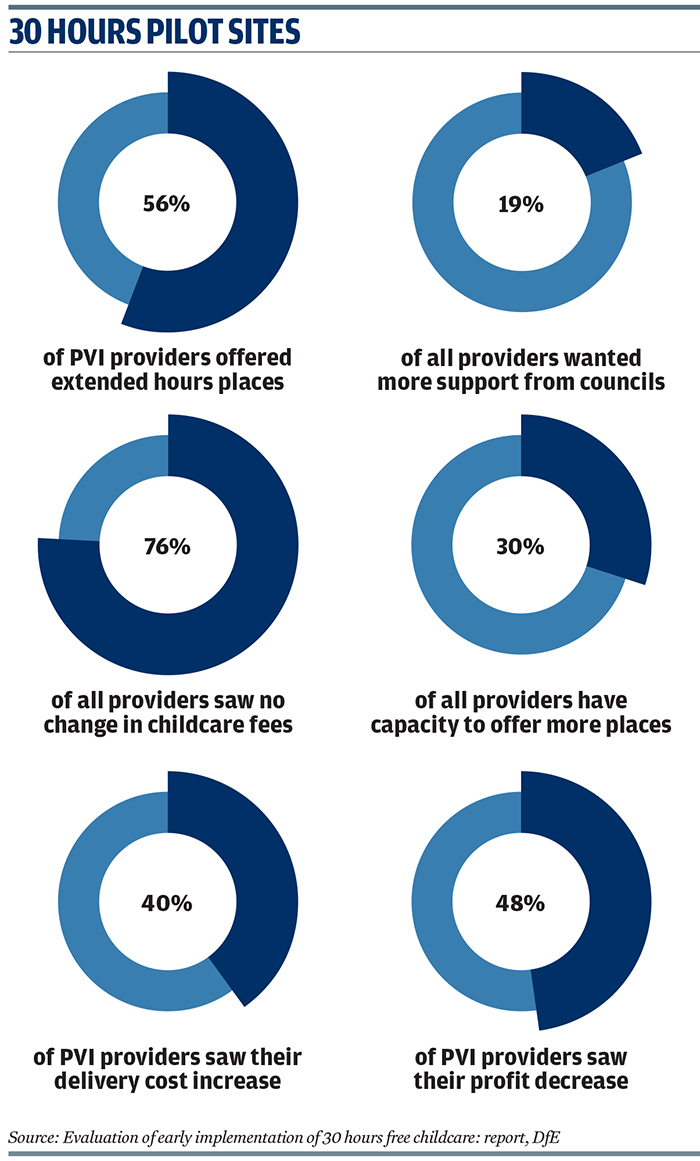30 hours free childcare: the key elements to making it a success
Derren Hayes
Tuesday, August 29, 2017
As England braces itself for the introduction of 30 hours free childcare for three- and four-year-olds amid concerns over funding, early years experts outline how to ensure the policy is implemented successfully.

Since first unveiled in the Conservative Party 2015 general election manifesto, the proposal to double the amount of free childcare available to working parents of three- and four-year-olds from 15 to 30 hours a week has been criticised by early years organisations.
Of greatest concern has been a lack of government funding underwriting the policy, which critics say means that providers will lose money on each free place.
This is supported by findings from research showing nearly half of private, voluntary and independent providers involved in the early implementer pilot sites have seen their costs rise and profits fall (see graphics).
Other concerns include a lack of flexibility over what extra services providers can charge parents for, a shortage of places due to lack of interest in the scheme from providers, and technical problems with the government website for parents to register their eligibility.
Despite these problems, 30 hours will be available England-wide from 1 September, so what three key pieces of advice do early years leaders have for ensuring the policy is implemented successfully, and what further support can councils give to help providers create more places?
BE CLEAR ABOUT ADMISSIONS AND CHANGING POLICIES
By Purnima Tanuku, National Day Nurseries Association
1. The majority of early years settings will try to offer 30 hours, but need confidence that they can have control over their own business model. Our survey last month found that 85 per cent of settings are only able to offer 30 hours by charging parents for additional services. And more than half will also limit places. The government needs to acknowledge that nurseries must be able to make mandatory charges to parents. Asking for charges on a voluntary basis cannot work in any business.
2. NDNA has been sharing the valuable knowledge and experiences of some member nurseries taking part in the early implementer pilots. First, remember that it is your nursery and you are in charge of how it is run. Think carefully about what you need to do to make sure you can offer 30 funded hours in a way that works for your nursery.
3. Crucial to this is looking at your admissions policy and making it clear how many places you can offer and when. Once you have this in place, communicate it effectively to parents from the outset so there can be no misconceptions and confusion later on. For example, if you can only offer free places for certain hours of the day and will need to charge parents for the remaining hours, make that very clear before offering a place. Our research shows that this policy is still woefully underfunded. Although full rollout is imminent, we will continue to lobby the government for sufficient hourly funding.
To help English nurseries deal with the pressure of the expanded free entitlement, NDNA has worked with the sector to create a new website, The Early Years Business Zone. There will be a number of free tools on the site including business appraisal, financial management and staffing analysis, as well as access to industry help and support. For more details, go to earlyyearsbusinesszone.org.uk
NO UNWARRANTED RESTRICTIONS FROM LOCAL AUTHORITIES
By Neil Leitch, Pre-school Learning Alliance
1. It is crucial local and national government work together to monitor funding rates and commit to reviewing rates to ensure they cover the cost of delivering places. We will continue to lobby for fairer funding, and we encourage parents and providers to sign up to our Fair Future Funding campaign.
2. Local authorities must not place unwarranted restrictions on providers. Our members have alerted us to instances of councils threatening that providers' funding will be withdrawn if they do not attend briefing meetings. This is unacceptable, but providers should be aware of what is and isn't expected of them. If providers have any doubt about their council's expectations, they should contact the Alliance.
3. To ensure the sector is not demonised for the failure of ‘free' childcare to materialise, it is vital that providers explain to parents why they are increasing prices for additional hours or services, and to make clear that there is no such thing as ‘free' childcare. The Alliance has produced resources to explain underfunding issues, and we encourage settings to share this information with parents.
The success of this policy will come down to how expectations - of parents, providers and government - are managed. At the moment, I fear that all parties are facing disappointment.
ENSURE CHILDMINDERS ARE PROMOTED AS PART OF THE SOLUTION
By Liz Bayram, Professional Association for Childcare and Early Years
- Childminders will need to play a critical role in the delivery of 30 hours if it is to be a success. The number of registered childminders has declined by nearly a quarter since 2012 and only a third are delivering the existing 15-hour entitlement to three- and four-year-olds. Yet 92 per cent have been rated "good" or "outstanding" by Ofsted. Low funding rates need to be increased as our fee survey shows childminders face a £400 a year shortfall for every 30 hours place they offer.
- Enable childminders to deliver funded places for related children in their care as in group settings, there is no restriction.
- Childminders need to be promoted as a high quality option to parents instead of being overlooked. Only seven per cent of funded places in the pilots were taken up with childminders, echoed by our Building Blocks survey showing nearly half of childminders surveyed do not offer funded places because no parent had asked for a place.
More can be done to support childminders to build sustainable businesses, including targeted business advice through our free Business Smart toolkit, peer-to-peer support, and championing childminding by national and local government, and the health service to parents.
HOW CAN COUNCILS SUPPORT PROVIDERS TO CREATE PLACES?
By James Hempsall, national programme director, Childcare Works
We've been working hard with every single local authority over the past year to drive forward all the key strategic and operational elements of 30 hours. Much of this has focused on ensuring there are places in areas where parental demand exists now and is predicted in the near future, as well as examining and suggesting ways in which providers can change to meet demand while safeguarding their future business success.
While 30 hours is different, there has been much learning from delivering 15 hours of free childcare to two-year-olds to draw upon.
It is certain that providers will need to work hard to make a success of 30 hours - however, there is much a local authority could and should do to make this easier.
Demand from parents and children is the single most powerful force for change. In the early implementer evaluations, I have heard how providers who were initially reluctant to get involved have been brought into delivery of 30 hours by local parents asking about their entitlements. This happened with two-year-olds as well.
To complement the communications providers have with potential and existing parents, it is vital that local authorities have a comprehensive local communications offer. Much of this can be delivered at low or no cost, and includes social media, information on the authority and partner websites, and a well-briefed legion of professionals and organisations working with parents in the community and at work - all of whom should know (or at least carry in their bag) the eligibility criteria, the application process and answers to frequently asked questions.
Childcare Act (2016) duties require local authorities to ensure for childcare sufficiency and provider business support is an essential element of this. Through regular childcare sufficiency assessments, councils can openly and clearly share data on levels of supply and demand to support settings' decisions around delivery, releasing spare capacity, and extending the capacity of existing settings, or by creating new ones.
This will help anticipate the changes to demand and supply at the beginning of each term, and especially in January and April 2018.
Providers tell me business support needs to be bespoke, informed and effective, and I agree - my view has always been generic business support does not cut it. More needs to be done to work with private sector settings in particular. Due to the cross-border nature of chains, this could be an opportunity for councils to collaborate and pool their resources. This is a two-way street, as settings have much to bring to the table in terms of their experience, skills and ideas.
Indeed, sharing local ideas and solutions between settings is what needs to be happening if we are to achieve inter-setting collaboration. We must develop partnerships that are good for settings and achieve quality transitions for children, and childcare solutions for parents. This takes work, a patient yet tenacious approach, and a particular skill set - often from a third party. Authorities need to facilitate at least the early stages of partnership working. Mutual and professional respect needs to be fostered through regular opportunities for local settings to come together in groups and networks.
I would also recommend a few targeted meetings bringing two or more providers together - with the council in the room - as the capacity for myths and misunderstandings cannot be underestimated, and the commonalities and shared challenges do need to be highlighted to all.





